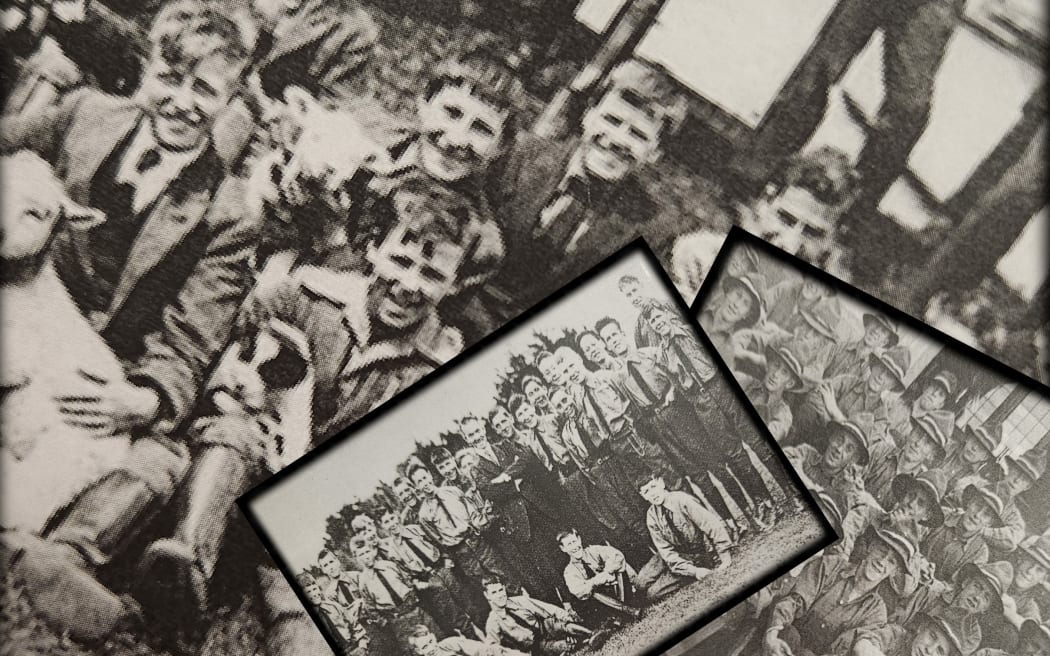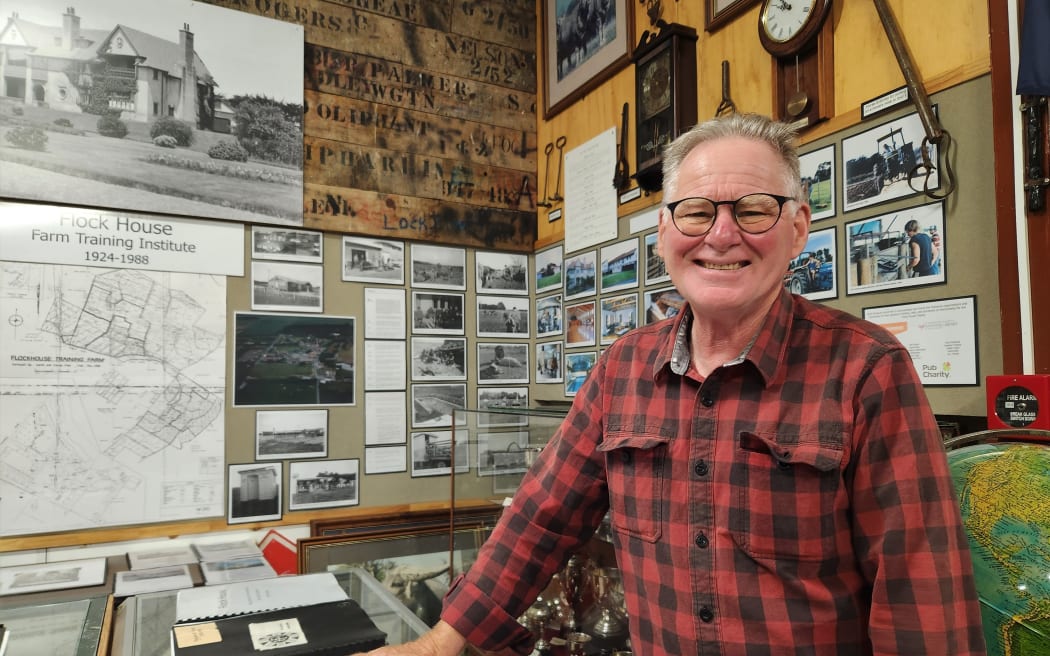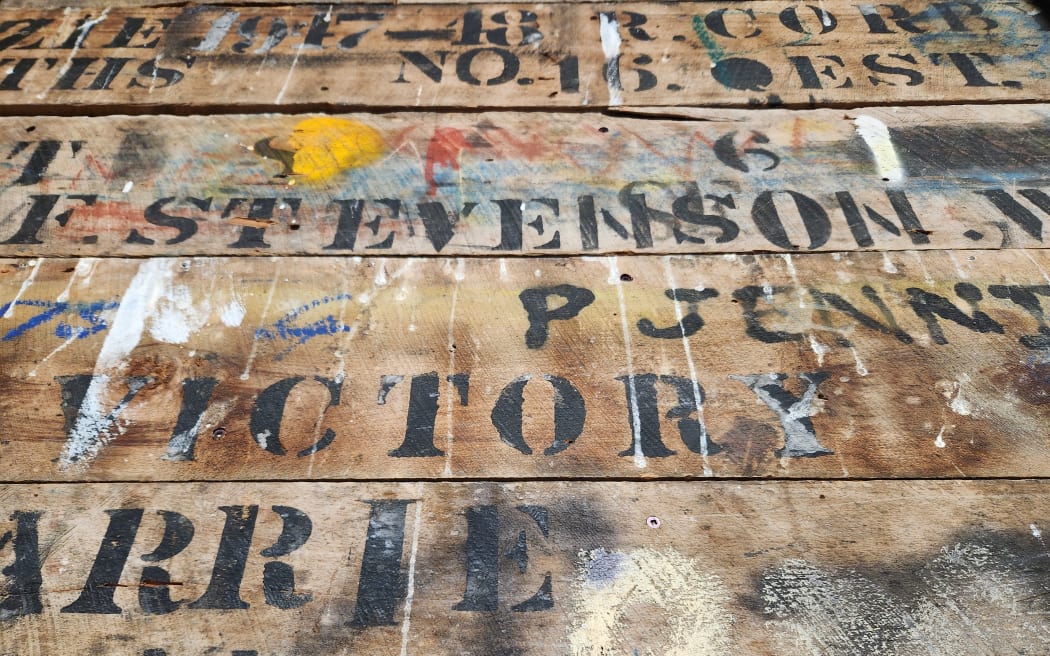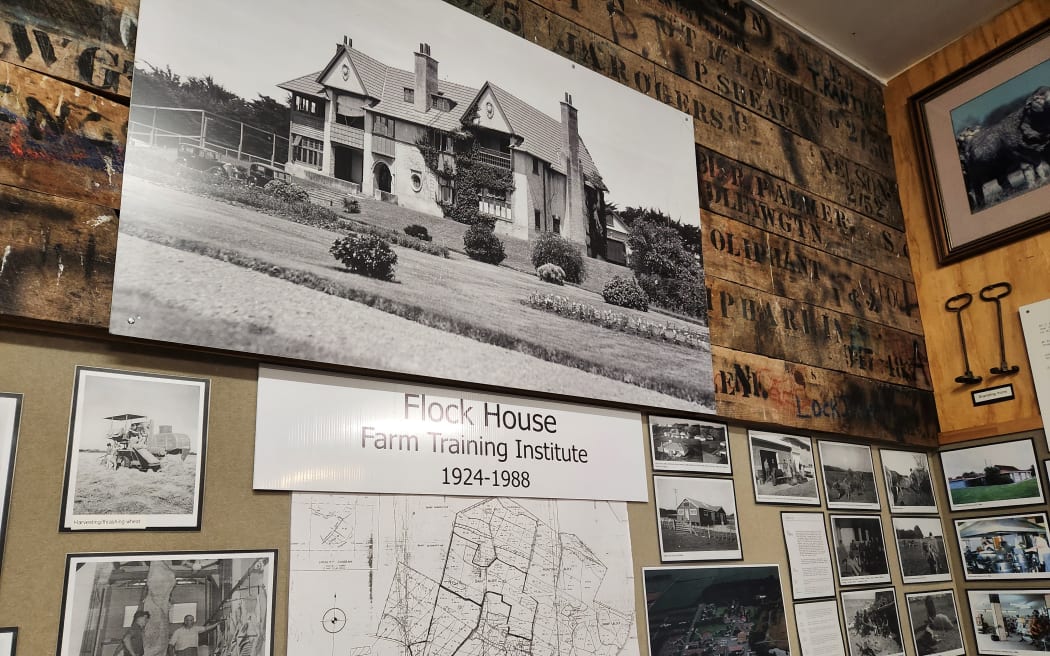
A selection of photos of the first Flock House cadets from Britain on display at the Bulls Museum Photo: Supplied
A search is underway for descendants of hundreds of British boys sent out for farming training in New Zealand a century ago.
Dressed in military style "lemon-squeezer" hats, ties and jodhpurs, they were the sons of seamen who had been killed or disabled during the First World War.
It's not known how many stayed and made a successful life farming in New Zealand, according to Alasdair Bettles-Hall, one of the descendants who is researching the stories of the first attendees of Flock House.

Alasdair Bettles-Hall at the Flock House display in the Bulls Museum Photo: RNZ/Sally Round
The first contingent of 25 lads arrived by ship 100 years ago, headed for the new agricultural training centre in Manawatū which had been set up with money from the wool industry in 1924.
The school, consisting of a grand homestead and 8000 acres, had been established with a 250,000 pound fund - profit from the government's sale of wool during the war.
New Zealand sheep farmers had earlier set up the New Zealand Sheepowners Acknowledgment of Debt to British Seamen Fund for the benefit of dependants of the men in the Royal Navy and Mercantile Marine who had lost their lives to keep shipping lanes open.
"It was realised it would be a help for widows, sometimes with multiple children, that maybe we should bring the children to New Zealand to train them up to be farmers," Bettles-Hall told Country Life.
One hundred and 28 daughters of the seamen were also sent from Britain under the scheme to learn skills like cooking, butter-making, nursing and bee-keeping.
After a year's training at Flock House, being taught every facet of farming in New Zealand by "well-trained agriculturalists of their day", the youths then went on to placements on farms throughout the country.

Graffiti on the boards of the Flock House woolshed, part of a Bulls Museum display Photo: RNZ/Sally Round
"The Fund hoped that they would stay.
"You've just had World War One, there's not as many men on the land ... a lot of these sheep stations were in very remote places.
"So I think maybe a subliminal motivation was to provide a labour force for the New Zealand sheep farmers."
Over the next few years, more than 600 youths came from Britain to train at Flock House which went on to become a flagship agricultural training school for the country, throwing its doors open to local cadets when the flow of young men from England stopped during the Great Depression.
But what happened to all those first cadets, some as young as 15?
With Flock House's establishment in 1924 being celebrated this year, Bettles-Hall has been trying to find out.
Starvation and stowaways
He has managed to trace 20 stories so far and relates one about two young boys during the Depression years, suffering "from starvation", who tried to stow away on a ship leaving Napier to get back home. They were returned only to stow away again and succeed.
Bettles-Hall's father, Victor, was in the 1929 intake.
Victor's own father, a widower and musician in the Royal Marines, had survived the war but was not able to take care of his son and placed him in an orphanage as a seven year old.
At 15, Victor was sent off to New Zealand.
"I've often thought 'what was going through my grandfather's mind?'" Bettles-Hall said.
"Either, 'good riddance young Victor, I don't need to worry about you ever again' or 'young Victor, this is the best thing that's ever going to happen in your life'.
"I think he suffered abandonment."

Memorabilia and photos of Flock House from its start in 1924 to its closure in 1988 are on permanent display at the Bulls Museum Photo: RNZ/Sally Round
Victor's father later apologised for not having the funds to bring him home.
Old photos show the boys "looking stoic", Bettles-Hall said.
In letters home, they wrote that they were having a whale of a time in a wonderful place, but who knows the reality, Bettles-Hall asks.
"I'm sure they felt homesick."
While working on a farm after Flock House, Victor met his wife, who turned out to be "the beacon of his life," Bettles-Hall said.
With a young family, he decided to move out of farming and into Feilding to work as a labourer.
Victor lost contact with all of his British family in the 1930s but reunited with his sister on a trip back to the UK, 60 years after she waved him goodbye from the Southampton docks.
Flock House also trained more than 3000 New Zealand cadets. It closed in 1988.
The reunion for those connected with Flock House is taking place in July in Palmerston North.
For more information or to tell your Flock House story, go to the Flock House 100 Year Anniversary website.


